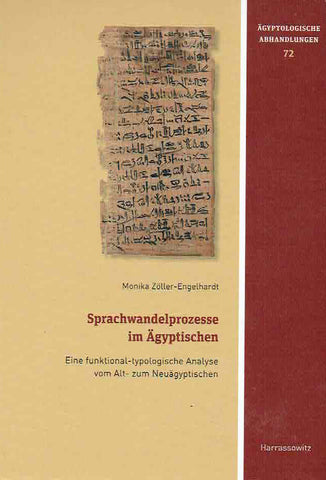Sprachwandelprozesse im Ägyptischen
95,00 $
ISBN: 978-3-447-10549-1
Description: hardback, 287 pages (24,5x17,5cm)
Condition: new
Weight: 735g.
Monika Zöller-Engelhardt, Sprachwandelprozesse im Ägyptischen, Eine funktional-typologische Analyse vom Alt- zum Neuägyptischen, Ägyptologische Abhandlungen 72, Harrassowitz, Wiesbaden 2016
Das Ägyptische durchläuft in seiner mehr als 4.000 Jahre umfassenden Geschichte mehrere Sprachphasen, die in Alt-, Mittel- und Neuägyptisch sowie Demotisch und Koptisch eingeteilt werden. Diese Phasen zeigen teils gravierende Unterschiede in ihrer sprachlichen Struktur, wodurch das Ägyptische ein ideales Forschungsfeld für diachrone Untersuchungen darstellt, die sich mit den Vorgängen und Ursachen sprachlichen Wandels auseinandersetzen.
Monika Zöller-Engelhardt analysiert in ihrer interdisziplinären Untersuchung auf der Basis eines umfangreichen Textkorpus aus Briefen und Alltagstexten ausgewählte Sprachwandelprozesse vom Alt- zum Neuägyptischen (ca. 2450–1070 v.Chr.). Im Fokus stehen dabei Innovationen in nominalen Ausdrücken, wie z.B. die Entstehung eines definiten und indefiniten Artikels, der Wandel nominaler Possession, aber auch Veränderungen der satzeinleitenden Partikel jw und verbaler Periphrasen mit jrj. Grundlage sind neben ägyptologischer Philologie vor allem funktional-typologische Modelle der modernen Linguistik wie Grammatikalisierungsprozesse und prototypische Konzepte, die es der Autorin ermöglichen, Zusammenhänge und Wechselwirkungen der einzelnen Entwicklungsstränge herauszuarbeiten. Auch Einflussfaktoren wie sprachlicher Varietät wird Rechnung getragen. Einführende Kapitel zu ägyptologischen und linguistischen Grundlagen ermöglichen zudem einem breiten Leserkreis den Zugriff auf altägyptisches Sprachmaterial. Der innovative fächerübergreifende Ansatz wird auch in der Methodik konsequent umgesetzt: Eine durchgängige interlineare Glossierung sämtlicher Originalbeispiele erleichtert den Zugang zum komplexen Sprach- und Schriftsystem der Hieroglyphen und des Hieratischen.
The Egyptian language is more than 4,000 years old and its long history has been divided by scholars into numerous linguistic phases including Old, Middle, and New Egyptian as well as demotic and Coptic. Important differences in linguistic structures can be seen in each phase, which makes the Egyptian language an ideal field for diachronic studies in which the processes and causes of linguistic change can be compared.
In her interdisciplinary work, Monika Zöller-Engelhardt has investigated the processes of linguistic change on the basis of an extensive body of texts, including letters and everyday writing, from the Old to the New Kingdom periods (ca. 2450-1070 BC). The focus of her analysis is the innovations in nominal expressions such as the development of definite and indefinite articles, the change in nominal possessives, the change in the introduction-particle ""jw,"" and verbal paraphrases with ""jrj."" In addition to Egyptian philology, the other basis for this investigation is the functional-typological model of modern linguistics, which looks at such linguistic features as the processes of grammaticalization and prototypical concepts, which the author implements to work out the contexts and interactions of the individual lines of development. Influential factors such as linguistic varieties are also considered in this work. The introduction provides access to the principal concepts of Egyptology and linguistics, which appropriate for a wide audience and offers and overview to the ancient Egyptian language materials. The innovative and interdisciplinary approach of this work is also realized in the methodology: a thorough, interlinear glossing, consisting of original examples, facilitates access to the complex systems of speech and writing, such as hieroglyphics and hieratic.
Description: hardback, 287 pages (24,5x17,5cm)
Condition: new
Weight: 735g.
Monika Zöller-Engelhardt, Sprachwandelprozesse im Ägyptischen, Eine funktional-typologische Analyse vom Alt- zum Neuägyptischen, Ägyptologische Abhandlungen 72, Harrassowitz, Wiesbaden 2016
Das Ägyptische durchläuft in seiner mehr als 4.000 Jahre umfassenden Geschichte mehrere Sprachphasen, die in Alt-, Mittel- und Neuägyptisch sowie Demotisch und Koptisch eingeteilt werden. Diese Phasen zeigen teils gravierende Unterschiede in ihrer sprachlichen Struktur, wodurch das Ägyptische ein ideales Forschungsfeld für diachrone Untersuchungen darstellt, die sich mit den Vorgängen und Ursachen sprachlichen Wandels auseinandersetzen.
Monika Zöller-Engelhardt analysiert in ihrer interdisziplinären Untersuchung auf der Basis eines umfangreichen Textkorpus aus Briefen und Alltagstexten ausgewählte Sprachwandelprozesse vom Alt- zum Neuägyptischen (ca. 2450–1070 v.Chr.). Im Fokus stehen dabei Innovationen in nominalen Ausdrücken, wie z.B. die Entstehung eines definiten und indefiniten Artikels, der Wandel nominaler Possession, aber auch Veränderungen der satzeinleitenden Partikel jw und verbaler Periphrasen mit jrj. Grundlage sind neben ägyptologischer Philologie vor allem funktional-typologische Modelle der modernen Linguistik wie Grammatikalisierungsprozesse und prototypische Konzepte, die es der Autorin ermöglichen, Zusammenhänge und Wechselwirkungen der einzelnen Entwicklungsstränge herauszuarbeiten. Auch Einflussfaktoren wie sprachlicher Varietät wird Rechnung getragen. Einführende Kapitel zu ägyptologischen und linguistischen Grundlagen ermöglichen zudem einem breiten Leserkreis den Zugriff auf altägyptisches Sprachmaterial. Der innovative fächerübergreifende Ansatz wird auch in der Methodik konsequent umgesetzt: Eine durchgängige interlineare Glossierung sämtlicher Originalbeispiele erleichtert den Zugang zum komplexen Sprach- und Schriftsystem der Hieroglyphen und des Hieratischen.
The Egyptian language is more than 4,000 years old and its long history has been divided by scholars into numerous linguistic phases including Old, Middle, and New Egyptian as well as demotic and Coptic. Important differences in linguistic structures can be seen in each phase, which makes the Egyptian language an ideal field for diachronic studies in which the processes and causes of linguistic change can be compared.
In her interdisciplinary work, Monika Zöller-Engelhardt has investigated the processes of linguistic change on the basis of an extensive body of texts, including letters and everyday writing, from the Old to the New Kingdom periods (ca. 2450-1070 BC). The focus of her analysis is the innovations in nominal expressions such as the development of definite and indefinite articles, the change in nominal possessives, the change in the introduction-particle ""jw,"" and verbal paraphrases with ""jrj."" In addition to Egyptian philology, the other basis for this investigation is the functional-typological model of modern linguistics, which looks at such linguistic features as the processes of grammaticalization and prototypical concepts, which the author implements to work out the contexts and interactions of the individual lines of development. Influential factors such as linguistic varieties are also considered in this work. The introduction provides access to the principal concepts of Egyptology and linguistics, which appropriate for a wide audience and offers and overview to the ancient Egyptian language materials. The innovative and interdisciplinary approach of this work is also realized in the methodology: a thorough, interlinear glossing, consisting of original examples, facilitates access to the complex systems of speech and writing, such as hieroglyphics and hieratic.

